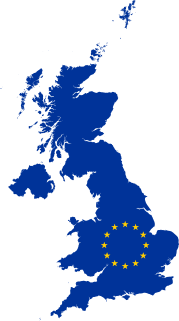Related Research Articles

Greenland, an autonomous territory within the Kingdom of Denmark is one of the EU members’ overseas countries and territories (OCT) associated to the European Union. Greenland receives funding from the EU for sustainable development and has signed agreements increasing cooperation with the EU.
The Beef Hormone Dispute is one of the most intractable agricultural controversies since the establishment of the World Trade Organization (WTO).

The European Union Customs Union (EUCU), formally known as the Community Customs Union, is a customs union which consists of all the member states of the European Union (EU), Monaco, and the British Overseas Territory of Akrotiri and Dhekelia. Some detached territories of EU states do not participate in the customs union, usually as a result of their geographic separation. In addition to the EUCU, the EU is in customs unions with Andorra, San Marino and Turkey, through separate bilateral agreements.

Bovine spongiform encephalopathy (BSE), commonly known as mad cow disease, is an incurable and invariably fatal neurodegenerative disease of cattle. Symptoms include abnormal behavior, trouble walking, and weight loss. Later in the course of the disease the cow becomes unable to function normally. There is conflicting information around the time between infection and onset of symptoms. In 2002, the WHO suggested it to be approximately four to five years. Time from onset of symptoms to death is generally weeks to months. Spread to humans is believed to result in variant Creutzfeldt–Jakob disease (vCJD). As of 2018, a total of 231 cases of vCJD had been reported globally.
The Trade Control and Expert System (TRACES), is a web-based veterinarian certification tool used by the European Union for controlling the import and export of live animals and animal products within and without its borders. Its network falls under the responsibility of the European Commission. TRACES constitutes a key element of how the European Union facilitates trade and improves health protection for the consumer, as laid down in the First Pillar principle. Other countries use computer networks to provide veterinary certification, but TRACES is the only supranational network working at a continental scale of 28 countries and almost 500 million people.
Equivalence is a term applied by the Uruguay Round Agreement on the Application of Sanitary and Phytosanitary Measures. World Trade Organization (WTO) Member countries shall accord acceptance to the Sanitary and Phytosanitary (SPS) measures of other countries if the exporting country demonstrates to the importing country that its measures achieve the importer’s appropriate level of sanitary and phytosanitary protection.

Relations between the European Union (EU) and the United Kingdom of Great Britain and Northern Ireland (UK) are governed, since 1 January 2021, by the EU–UK Trade and Cooperation Agreement (TCA). However since Brexit relations have been poor.

Brexit was the withdrawal of the United Kingdom (UK) from the European Union (EU) at 23:00 GMT on 31 January 2020. The UK is the only sovereign country to have left the EU or the EC. The UK had been a member state of the EU or its predecessor the European Communities (EC), sometimes of both at the same time, since 1 January 1973. Following Brexit, EU law and the Court of Justice of the European Union no longer have primacy over British laws, except in select areas in relation to Northern Ireland. The European Union (Withdrawal) Act 2018 retains relevant EU law as domestic law, which the UK can now amend or repeal. Under the terms of the Brexit withdrawal agreement, Northern Ireland continues to participate in the European Single Market in relation to goods, and to be a de facto member of the EU Customs Union.
A customs declaration is a form that lists the details of goods that are being imported or exported when a citizen or visitor enters a customs territory. Most countries require travellers to complete a customs declaration form when bringing notified goods across international borders. Posting items via international mail also requires the sending party to complete a customs declaration form.

As of January 2021, the United Kingdom's post-Brexit relationship with the European Union and its members is governed by the Brexit withdrawal agreement and the EU–UK Trade and Cooperation Agreement. The latter was negotiated in 2020 and has applied since 2021.

The impact of Brexit on the Irish border and its adjacent polities involves changes in trade, customs, immigration checks, local economies, services, recognition of qualifications, medical cooperation, and other matters, now that it is the only external EU land border between the United Kingdom and the European Union.
The Irish backstop was a proposed protocol to a draft Brexit withdrawal agreement that never came into force. It was developed by the May government and the European Commission in December 2017 and finalised in November 2018, that aimed to prevent an evident border between the Republic of Ireland and Northern Ireland after Brexit.

The Protocol on Ireland/Northern Ireland, commonly abbreviated to the Northern Ireland Protocol, is a protocol to the Brexit withdrawal agreement that governs the unique customs and immigration issues at the border on the island of Ireland between the United Kingdom of Great Britain and Northern Ireland and the European Union, and on some aspects of trade in goods between Northern Ireland and the rest of the United Kingdom. Its terms were negotiated shortly before the 2019 general election and concluded immediately after it, in December of that year. The withdrawal agreement as a whole, including the protocol, was ratified in January 2020. The Republic of Ireland–United Kingdom border has had a special status since the thirty-year internecine conflict in Northern Ireland was ended by the Good Friday Agreement of 1998. As part of the Northern Ireland Peace Process, the border has been largely invisible, without any physical barrier or custom checks on its 270 crossing points; this arrangement was made possible by both countries' common membership of both the EU's Single Market and Customs Union and of their Common Travel Area.

This article outlines the predicted impact of Brexit, the withdrawal of the United Kingdom (UK) from the European Union (EU) and the European Atomic Energy Community.
The trade policy of Switzerland refers to Switzerland's approach to importing and exporting with other countries.

Trade negotiations between the UK and the EU took place after Brexit between the United Kingdom and the European Union for a trade agreement to make trade easier than it would have been without such a deal. The deal would cover both tariff and non-tariff barriers to trade. The negotiations formally ended on 24 December 2020 with an agreement approved in principle by the UK Prime Minister and the President of the European Commission. The result was the EU–UK Trade and Cooperation Agreement (TCA).

The EU–UK Trade and Cooperation Agreement (TCA) is a free trade agreement signed on 30 December 2020, between the European Union (EU), the European Atomic Energy Community (Euratom), and the United Kingdom (UK). It provisionally applied from 1 January 2021, when the Brexit transition period ended, before formally entering into force on 1 May 2021, after the ratification processes on both sides were completed: the UK Parliament ratified on 30 December 2020; the European Parliament and the Council of the European Union ratified in late April 2021.

Following its withdrawal from the European Union on 31 January 2020, the United Kingdom began negotiations on several free trade agreements to remove or reduce tariff and non-tariff barriers to trade, both to establish new agreements and to replace previous EU trade agreements. Withdrawal ended 47 years of membership during which all its trading agreements were negotiated by the European Commission on behalf of the bloc as a whole. The UK did not actually withdraw from the European Single Market and the European Union Customs Union until 31 December 2020.

UK Conformity Assessed (UKCA) marking is a conformity mark that indicates conformity with the applicable requirements for products sold within Great Britain.
The Irish Sea border is an informal term for the trade border between Northern Ireland and Great Britain. It was specified by the Ireland/Northern Ireland Protocol of the Brexit withdrawal agreement, was refined by the Joint Committee in December 2020, and came into effect on 1 January 2021 following the end of the Brexit transition period. As a result of the Agreement, Northern Ireland remains aligned to the European Single Market in a limited way for goods, whilst remaining part of the United Kingdom customs territory and the UK internal market. Its effect is that the need for customs checks on the Irish border has been avoided, and a hard border has not been re-established.
References
- 1 2 3 "Veterinary Agreement between Switzerland and the EU". Government of Switzerland. Food Safety and Veterinary Office. 2017-03-07.
- 1 2 "Food Safety : Agreements with non-EU countries". European Commission. Directorate-General for Health and Food Safety. Retrieved 3 April 2021.
- ↑ SPS Certification Working Group (14 June 2021). MINIMISING SPS FRICTION IN EU TRADE: A new process design for the new relationship with the EU (PDF) (Report).
- ↑ "UK meat industry groups call for veterinary agreement to protect exports to the EU". The Cattle Site. 14 June 2021.
- ↑ "'Disaster for the industry': UK food exports to EU plummet". Farming Today . 18 June 2021.
- ↑ Foster, Peter; Beesley, Arthur (22 February 2021). "DUP's shifting stance on 'Swiss-style' EU trade alignment revealed. Unionist party privately lobbied UK for such a deal but now rejects idea as solution to Northern Ireland's Brexit problems".
- ↑ "Establishing a Common Veterinary Area between GB & EU/NI: An Animal Welfare Solution Not to be Missed". Ulster Society for the Prevention Cruelty to Animals. Retrieved 3 April 2021.
- ↑ "USPCA calls for common veterinary area to reduce livestock checks arising from the protocol". THE IRISH NEWS. 13 March 2021.
- ↑ "UEVP Newsletter March 2021" (PDF). Union of European Veterinary Practitioners. March 2021.
- ↑ "New post-Brexit food checks could be on the way". Speciality Food Magazine. ACEVILLE PUBLICATIONS LTD. 19 May 2021.
- ↑ Irwin, Vikki (22 June 2021). "Brexit: Horse racing hit by rules over exports". BBC News.